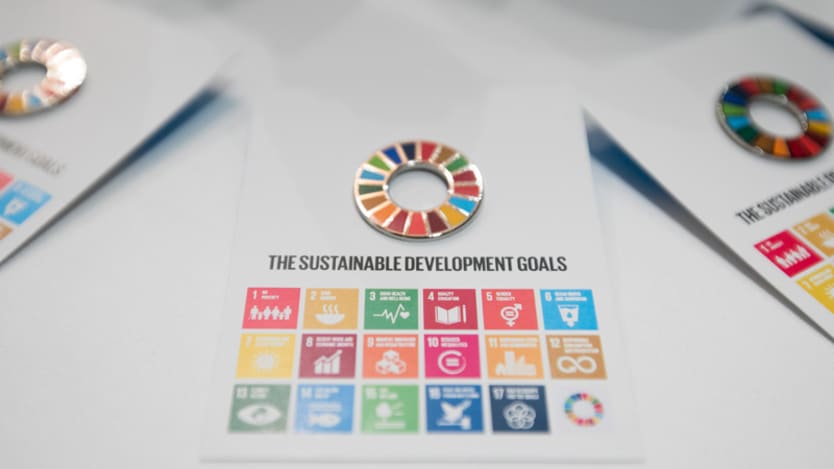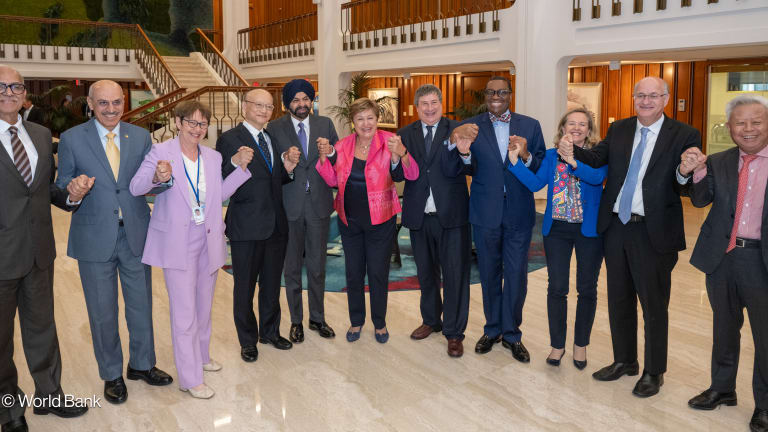Opinion: Here's how to strengthen development cooperation — and meet the SDGs

The world stands 10 years away from the deadline to achieve the 2030 Agenda — and yet we are not on track to achieve the Sustainable Development Goals.
The international community must think differently about our efforts to get back on track — and that means advancing the effectiveness of development cooperation. For long-lasting results, this will require a focus on country ownership, development results, inclusive partnerships, transparency, and mutual accountability.
These four principles of effectiveness provide a basis for more empowered, more equal, partnerships. And that matters because ultimately, it will be how we work together that defines our success.
The Global Partnership for Effective Development Co-operation — a multistakeholder partnership supported jointly by OECD and the United Nations Development Programme — looks closely at the “how.” The partnership aims to advance the effectiveness of joint development efforts — by governments, civil society, the private sector, and many others — to deliver results that are long-lasting and contribute to the achievement of the SDGs.
Funding access to justice, a 'cross-cutting enabler of the SDGs'
Funders, implementers, and state representatives are in New York this week to discuss progress and new ideas to finance access to justice. One idea already has the attention of several foundations.
Our institutions track progress toward more effective development co-operation through data collection led by developing partner countries. In 2018, 86 partner countries with more than 100 partners took part in this exercise, covering disbursements of $58.8 billion in development loans and grants.
The results of this vast analysis are now available, and key takeaways from this evidence include the following:
• Developing partner country governments have made significant progress in strengthening the quality of national development planning overtime; yet development partners’ alignment to these priorities and country-owned results frameworks is declining.
• More systematic and meaningful consultations with development stakeholders are needed both by partner country governments and development partners to ensure strong ownership of development efforts.
• In response to the rapidly changing development landscape and the ambition of leaving no one behind, country-level mutual accountability mechanisms are evolving and becoming more inclusive.
Where can we do better than we already have, in leading and supporting development efforts?
Since 2011, the proportion of developing partner countries with a high-quality national development strategy has almost doubled and there has been important progress also in integrating the SDGs in their planning. However, the 2018 data indicates that partner countries continue to face challenges in obtaining information on forward expenditure and implementation plans. Furthermore, development partners’ alignment of their programs to country objectives — as well as their use of national statistics and monitoring systems to track program results — remains limited; and only a third of partner country governments indicate that they have the necessary data to monitor the implementation of their national development strategies.
A good planning and monitoring system is the basis for accountability and transparency. Access to public information on the delivery of key actor’s commitments on development co-operation is critical for the whole-of-society to be able to work toward more effective development co-operation.
Blended finance's role in SDGs depends on these changes
Blended finance's potential is threatened by a financial system that isn't forward-looking, according to a group of development financiers and practitioners gathered at Skoll World Forum this week.
It is encouraging to observe that, in 2018, there is more information on development co-operation publicly available than in 2016. While this is good news, the real impact of public information on accountability requires accelerated efforts in timely reporting and making forward-looking development co-operation information better available to also include more planned development co-operation finance in national budgets that are under parliamentary oversight.
Trust is at the heart of effective collaboration, fostered by mutual dialogue and shared assessments between partners. The 2018 monitoring looked into the existence and quality of mutual accountability systems at the partner country level. While countries with high ODA dependency are more likely to have quality mutual accountability mechanisms in place, other country contexts are moving away from traditional structures. This shift may reflect their orientation toward innovative financing with a diverse range of partners.
How can the whole of society achieve better cooperation, together?
Real effectiveness should be measured by addressing the needs of the people, and to reaching the most vulnerable in society, which can only be done with the participation of all relevant actors to shape national development priorities.
While nearly all partner countries report that they consult with national stakeholders in the design of development strategies, civil society organizations reported that they are experiencing an increase in their constraints to participate in decision-making, negatively affecting their ability to contribute to national development processes. These challenges, according to CSOs, include legal and regulatory frameworks that provide limited protection in practice. This situation aligns with the existing concerning evidence that the space for civil society actors is shrinking.
Results of the report show that, of all national stakeholders, development partners consult most with civil society organizations on their development cooperation policies. However, in more than half of the participating countries CSOs reported that the agenda of these consultations is largely set by development partners and focuses on pre-determined policies and priorities. Furthermore, CSOs say a more diverse range of CSOs need to be invited to the table.
In an effort to leverage the private sector’s ingenuity and impact in the 2030 Agenda, the global partnership is promoting country-level partnerships with the private sector through development co-operation. Diverse stakeholders in the public and private sector evaluated the quality of the public-private dialogue at the country level, and there was unanimous agreement on the existence of a strong willingness to engage. However, private sector stakeholders’ views concerning inclusiveness and relevance of the dialogue, among other elements, are less positive. This presents a critical need for reflection on the quality of engagement efforts by governments that lead the development agenda.
How can we adapt to do better and look to the future?
To reaffirm this recognition of effectiveness as an essential driver for sustainable development, the diverse range of stakeholders that comprise the global partnership will convene at the Senior–Level Meeting in New York on July 13-14, 2019. The SLM presents a unique opportunity to review progress and expand the effectiveness network by bringing together development actors on an equal footing to explore and address challenges to an inclusive and sustainable future.
Search for articles
Most Read
- 1
- 2
- 3
- 4
- 5









